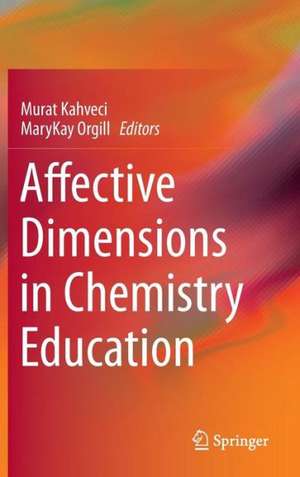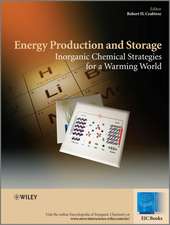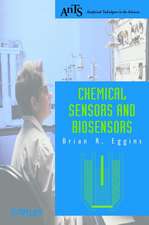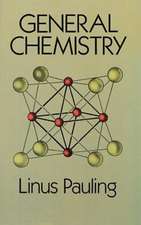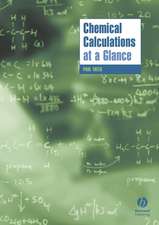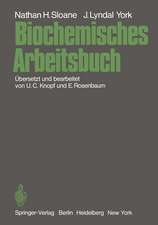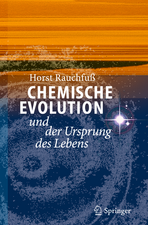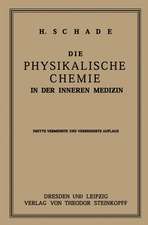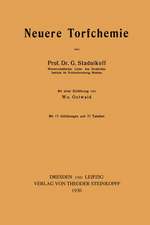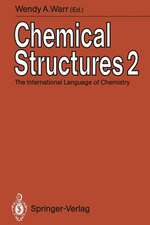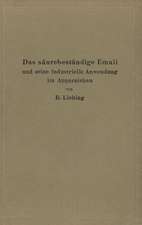Affective Dimensions in Chemistry Education
Editat de Murat Kahveci, MaryKay Orgillen Limba Engleză Hardback – 21 ian 2015
| Toate formatele și edițiile | Preț | Express |
|---|---|---|
| Paperback (1) | 642.18 lei 6-8 săpt. | |
| Springer Berlin, Heidelberg – 6 oct 2016 | 642.18 lei 6-8 săpt. | |
| Hardback (1) | 648.42 lei 6-8 săpt. | |
| Springer Berlin, Heidelberg – 21 ian 2015 | 648.42 lei 6-8 săpt. |
Preț: 648.42 lei
Preț vechi: 762.85 lei
-15% Nou
Puncte Express: 973
Preț estimativ în valută:
124.08€ • 129.81$ • 103.07£
124.08€ • 129.81$ • 103.07£
Carte tipărită la comandă
Livrare economică 02-16 aprilie
Preluare comenzi: 021 569.72.76
Specificații
ISBN-13: 9783662450840
ISBN-10: 3662450844
Pagini: 499
Ilustrații: XII, 318 p. 53 illus., 22 illus. in color.
Dimensiuni: 155 x 235 x 25 mm
Greutate: 0.64 kg
Ediția:2015
Editura: Springer Berlin, Heidelberg
Colecția Springer
Locul publicării:Berlin, Heidelberg, Germany
ISBN-10: 3662450844
Pagini: 499
Ilustrații: XII, 318 p. 53 illus., 22 illus. in color.
Dimensiuni: 155 x 235 x 25 mm
Greutate: 0.64 kg
Ediția:2015
Editura: Springer Berlin, Heidelberg
Colecția Springer
Locul publicării:Berlin, Heidelberg, Germany
Public țintă
ResearchCuprins
Meeting educational objectives in the affective and cognitive domains: Personal and social constructivist perspectives on enjoyment, motivation and learning chemistry.- Evaluating the Affective Dimension in Chemistry Education.- Getting involved: Context- based learning in chemistry education.- Gender Perspective on Affective Dimensions of Chemistry Learning.- Intuitions about Science, Technology and Nature – A Fruitful Approach to Understand Judgments about Socio-Scientific Issues.- Implementing Inquiry-based Science Education to Foster Emotional Engagement of Special Needs Students.- Affect and meeting the needs of the gifted chemistry learner: providing intellectual challenge to engage students in enjoyable learning.- It’s the situation that matters - Affective involvement in context-oriented learning tasks.- Gathering psychometric evidence for ASCIV2 to support cross-cultural attitudinal studies for college chemistry programs .- Secondary School Students’ Chemistry Self-Efficacy: Its Importance, Measurement, and Sources.- Second Year College Students’ Scientific Attitudes and Creative Thinking Ability: Influence of a Problem-Based Learning (PBL) Chemistry Laboratory Course.- Neuroscience Engagement: The Influences of Chemistry Education on Affective Dimensions.- Evaluating Drawings to Explore Chemistry Teachers` Pedagogical Attitudes.- Chemistry Teachers` Attitudes and Needs when Dealing with Linguistic Heterogeneity in the Classroom.- Majors’ Gender-Based Affective States toward Learning Physical Chemistry.
Notă biografică
Dr. Murat Kahveci / Canakkale Onsekiz Mart University, Turkey, mkahveci@comu.edu.tr
Dr. MaryKay Orgill / University of Nevada, Las Vegas, USA, marykay.orgill@unlv.edu
Murat Kahveci is an Associate Professor of Chemistry Education at Canakkale Onsekiz Mart University, who has dual master’s degrees both in physical chemistry and science education, and a doctor of philosophy degree in science education, awarded by the Florida State University. Since 2005, he taught various education and chemistry courses at higher education. In 2007, while holding a Senior Researcher position at the University of Chicago, he got the chance of developing his skills on large-scale science education projects and writing grant proposals to leading funding agencies in the U.S., such as National Science Foundation and Institute of Education Sciences. He was appointed by the European Commission (EU) in years 2008, 2009, and 2010 as an expert for reviewing the specific calls for IBSE under FP7 Science-in-Society Program. In 2012, he was invited to Brussels to attend a workshop as an expert about the future options of the
Science-in-Society Program and their expected impacts. He is the author of “Shared perceptions of professors about instructional interactivity” published by VDM Verlag Dr. Müller, Saarbrücken, Germany. Since Summer 2011, he has been serving as the Associate Editor of Electronic Journal of Science Education.
Dr. MaryKay Orgill is an Associate Professor of Chemistry at the University of Nevada, Las Vegas (USA). After a high school teacher told her that girls couldn’t “do chemistry,” she entered Brigham Young University as a chemistry major (B.S. 1995). She was surprised to find that she actually liked chemistry—and loved teaching it; so she enrolled in a graduate program at Purdue University to study both biochemistry (M.S. 1999) and chemical education (Ph.D. 2003). She continued to pursue both interests as a first-yearfaculty member with a joint appointment in biochemistry and science education at the University of Missouri-Columbia. During that year, she took on the extra challenge (and incredible learning experience) of teaching a high school chemistry class. In 2004, she moved to UNLV, where her research focuses on using qualitative methods to examine students’ understandings of chemistry and biochemistry concepts (for example, students’ understandings of buffers or of protein translation). Since her arrival at UNLV, Dr. Orgill has delivered professional development courses designed to increase the science and mathematics content knowledge of local primary and secondary teachers. In recent years, she has also become involved with faculty professional development, as both the international advisor for the Australian Advancing Science by Enhancing Learning in the Laboratory (ASELL) project and as the principal investigator of the corresponding chemistry-focused project in the USA.
Dr. MaryKay Orgill / University of Nevada, Las Vegas, USA, marykay.orgill@unlv.edu
Murat Kahveci is an Associate Professor of Chemistry Education at Canakkale Onsekiz Mart University, who has dual master’s degrees both in physical chemistry and science education, and a doctor of philosophy degree in science education, awarded by the Florida State University. Since 2005, he taught various education and chemistry courses at higher education. In 2007, while holding a Senior Researcher position at the University of Chicago, he got the chance of developing his skills on large-scale science education projects and writing grant proposals to leading funding agencies in the U.S., such as National Science Foundation and Institute of Education Sciences. He was appointed by the European Commission (EU) in years 2008, 2009, and 2010 as an expert for reviewing the specific calls for IBSE under FP7 Science-in-Society Program. In 2012, he was invited to Brussels to attend a workshop as an expert about the future options of the
Science-in-Society Program and their expected impacts. He is the author of “Shared perceptions of professors about instructional interactivity” published by VDM Verlag Dr. Müller, Saarbrücken, Germany. Since Summer 2011, he has been serving as the Associate Editor of Electronic Journal of Science Education.
Dr. MaryKay Orgill is an Associate Professor of Chemistry at the University of Nevada, Las Vegas (USA). After a high school teacher told her that girls couldn’t “do chemistry,” she entered Brigham Young University as a chemistry major (B.S. 1995). She was surprised to find that she actually liked chemistry—and loved teaching it; so she enrolled in a graduate program at Purdue University to study both biochemistry (M.S. 1999) and chemical education (Ph.D. 2003). She continued to pursue both interests as a first-yearfaculty member with a joint appointment in biochemistry and science education at the University of Missouri-Columbia. During that year, she took on the extra challenge (and incredible learning experience) of teaching a high school chemistry class. In 2004, she moved to UNLV, where her research focuses on using qualitative methods to examine students’ understandings of chemistry and biochemistry concepts (for example, students’ understandings of buffers or of protein translation). Since her arrival at UNLV, Dr. Orgill has delivered professional development courses designed to increase the science and mathematics content knowledge of local primary and secondary teachers. In recent years, she has also become involved with faculty professional development, as both the international advisor for the Australian Advancing Science by Enhancing Learning in the Laboratory (ASELL) project and as the principal investigator of the corresponding chemistry-focused project in the USA.
Textul de pe ultima copertă
This is a unique resource for those wishing to address the affective domain as they research and solve problems in chemistry education. Contributions by world-leading experts cover both fundamental considerations and practical case studies. This work fills a gap in the literature of chemistry education, which so far has focussed mainly on the cognitive domain. The affective domain refers to feelings-based constructs such as attitudes, values, beliefs, opinions, emotions, interests, motivation, and a degree of acceptance or rejection. It can affect students’ interest in science topics and their motivation to persevere in learning science concepts.
Caracteristici
First book on the subject Contributions from leading experts in chemistry education Covers both fundamental considerations and practical case studies
